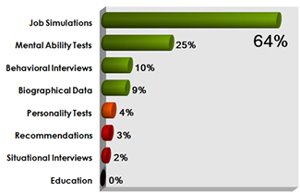5 ½ Reasons Why You Should Include Simulations in Your Hiring and Training Processes
People are your most precious resource. Nobody WANTS to make a mistake in hiring or promotions. When it comes to training Andy Grove, the Intel visionary, said it best, “The most important charge a good manager owns is the responsibility to continuously train his/her employees.”
Below are the 5 ½ reasons why simulations should be an integral part of your hiring, promotion and training processes.
-
The 5 to 1 Ratio
A mis-hire/promote costs the company 5 times the candidate’s annual compensation ($50,000 salary costs the company $250,000).
With training its just as easy to see the ROI. A business parable for you:
CEO said to the CFO ‘We have to train our people to get better.’
CFO says ‘Yea but what if we invest time and money to train them and they leave us to go to our competitor?’
CEO shoots back ‘What if we don’t train them and they stay?’
Whether it is a mis-hire or a less than adequately trained employee the impact on client relations, revenue, productivity, supervision time and morale is negative and it is huge.
-
The Power of Proof
Have you ever had an interview where the person told you they couldn’t do the job? Or have you ever had a person who “stretched” their abilities in the interview and as a result you were cleaning their messes for days, weeks or months after?
A best practice simulation provides you “Point-to-Point Correspondence” with the job. When the activities found in the simulation are a replica of activities that are required on the job, you get an accurate portrayal of skill level.
This is also why simulations are critical to training. Do you really want salespeople “practicing” on customers? Of course you don’t! General George Patton once said “The more my troops sweat in peacetime the less they bleed during combat.” Simulations are a must in all continual development.
-
How do They Handle the Debrief
Once they perform in the simulation how do they respond to constructive criticism? Are they thin-skinned? Do they gloat? Is their self-confidence warranted? Many times, you find out the best and the worst of people by observing how they handle coaching.
It also opens a window to know how they learn best. Through the Debrief you will discover what they will and won’t respond to. This can be invaluable as you continue to train and develop your team.
-
Go to the Video
When recorded, simulations help reduce, if not remove bias and subjectivity in the hiring process in one BIG way, “The eye in the sky does not lie.” You don’t want a he said/she said situation in any business scenario, but especially in simulations.
Here’s a great example of the benefit of recording simulations: A hiring manager who got a ‘good hit’ off a candidate, in an interview, might get a completely different feeling after watching a recorded simulation. The candidate might be the most charming person in the world, but when the time came he didn’t have the skills he trumpeted. In any business, that is a disaster averted.
Recorded simulations are irreplaceable in training as well. There is nothing better than being able to go back and review specific areas for either praise or correction. Plus, reviewing with individuals their recorded progress or regression is a very powerful training tool.
-
Onboarding
Even if somebody is an A-Player it does not mean they are perfect. Too many onboarding programs fail to adapt to the candidate, thus slowing the speed to effectiveness of the new hire.
Simulations don’t just weed out bad candidates. They also help you to assess a good candidate’s specific strengths and weaknesses in a hyper-accurate way. This allows you to design/implement an onboarding process to speed them to productivity. Not to mention it helps in offer decisions like salary negotiations.
5 ½. Positioning Your Company as the Best
The War for Talent is upon us and there are only so many A-Players out there. The mistake most organizations commit is purposefully making the hiring process easier out of fear of losing the candidate.
Thomas Payne said, “What we obtain too cheap, we esteem too lightly: it is dearness only that gives everything its value.” Being with the BEST requires paying the PRICE. Candidates learn respect for the position and respect for the company by demonstrating how seriously the company takes the hiring process. The best  candidates don’t want to be with some company that just rolls over. Remember everybody wants to belong to The Club that is impossible to get in.
candidates don’t want to be with some company that just rolls over. Remember everybody wants to belong to The Club that is impossible to get in.
87% of people who voluntarily (i.e .Quit) leave a company do so because of a lack of growth and development opportunity. Its human nature to want to improve, to develop new skills, succeed and advance. If you have good people, make them better.
Use simulations to continually train and develop your team. And you know what they call the company with the top employees… they call that company the BEST!
To ensure you are hiring A-Players and for training to be impactful and ‘sticky’ both have to be closely tied to how things are actually done in your organization. This is why simulations are such a critical management tool.
The Right Way to Hold People Accountable
Hi Folks. In my previous blog post, I was talking about holding yourself accountable as a leader. Well ‘lo and behold this article pops up in my email box this morning.
It is a great piece on the topic of accountability and the 5 areas where you must BE CLEAR for real accountability to truly exist. I will be continue digging into this topic as it relates to sales leadership and management as January progresses.
Here is an excerpt from the article and the link to the entire article is below.
- Clear expectations. The first step is to be crystal clear about what you expect. This means being clear about the outcome you’re looking for, how you’ll measure success, and how people should go about achieving the objective. It doesn’t all have to come from you. In fact, the more skilled your people are, the more ideas and strategies should be coming from them. Have a genuinely two-way conversation, and before it’s over, ask the other person to summarize the important pieces — the outcome they’re going for, how they are going to achieve it, and how they’ll know whether they’re successful — to make sure you’re ending up on the same page. Writing out a summary is a good idea but doesn’t replace saying it out loud.
- Clear capability. What skills does the person need to meet the expectations? What resources will they need? If the person does not have what’s necessary, can they acquire what’s missing? If so, what’s the plan? If not, you’ll need to delegate to someone else. Otherwise you’re setting them up for failure.

- Clear measurement. Nothing frustrates leaders more than being surprised by failure. Sometimes this surprise is because the person who should be delivering is afraid to ask for help. Sometimes it comes from premature optimism on both sides. Either way, it’s completely avoidable. During the expectations conversation, you should agree on weekly milestones with clear, measurable, objective targets. If any of these targets slip, jump on it immediately. Brainstorm a solution, identify a fix, redesign the schedule, or respond in some other way that gets the person back on track.
- Clear feedback. Honest, open, ongoing feedback is critical. People should know where they stand. If you have clear expectations, capability, and measurement, the feedback can be fact-based and easy to deliver. Is the person delivering on her commitments? Is she working well with the other stakeholders? If she needs to increase her capability, is she on track? The feedback can also go both ways — is there something you can be doing to be more helpful? Give feedback weekly, and remember it’s more important to be helpful than nice.
- Clear consequences. If you’ve been clear in all of the above ways, you can be reasonably sure that you did what’s necessary to support their performance. At this point, you have three choices: repeat, reward, or release. Repeat the steps above if you feel that there is still a lack of clarity in the system. If the person succeeded, you should reward them appropriately (acknowledgement, promotion, etc.). If they have not proven accountable and you are reasonably certain that you followed the steps above, then they are not a good fit for the role, and you should release them from it (change roles, fire them, etc.).
Link to the rest of the article is right here
The Right Way to Hold People Accountable
Are You Holding Yourself Accountable as a Leader?
I spend my days helping organizations grow their sales an average of 42%. The longer I am in this field the more I realize NOTHING is more important than having the right people in place, especially in leadership. One of my favorite quotes on the subject comes from Alexander the Great: “I am not afraid of an army of lions led by a sheep; I am afraid of an army of sheep led by a lion.”
We can set processes in place and develop naive sales people into savvy business people but if the people at the top don’t get it we may as well go to the window and throw our money out of it.
This is a BIG area of concern for every sales leader out there in the coming year. I promise to do everything I can to help you keep your eyes on the prize and doing the things needed to be a success but in the end it comes down to you. Or as I like to say “you can either make sales or you can make excuses but you can’t do both.”
Couple questions to ask yourself:
- “What are you accountable for as a leader and are YOU meeting those expectations?”
- “How do you hold yourself accountable?” Do you have an“accountability partner” or do you just “wing it”?
- “Do you have clearly defined and communicated expectations?”
- “How do you keep FOCUSED?”
Below is the text from a one page reminder Click Here for the PDF version of this http://www.slideshare.net/JohnKolencik/are-holding-yourself-accountable-as-a-leader
“As leaders, we enjoy the responsibility of helping our people develop in a way that encourages them to hold themselves accountable for their attitudes, their work, and their results.
We need to be as disciplined, resourceful, and resilient in our efforts as we ask our people to be in theirs.
Relentless leadership is embracing the fact that the need for reinforcement never ends and uncomfortable conversations are a necessity. This is how something special is created.”
Click Here for the PDF version of this http://www.slideshare.net/JohnKolencik/are-holding-yourself-accountable-as-a-leader
Hiring A Sales Superstar: The Wrap-Up
All right now, you have put you candidates through the prescribed series of interviews, tests and simulations. You are down to the candidate you want to hire so now what?
Hiring A Sales Superstar: Constructing & Conducting a Sales Simulation
John C. KolencikWhen I was a kid and would get into trouble almost always my parents would find out. The next 20 minutes, after their discovery, I would spend apologizing, trying to avoid the inevitable punishment that was coming. That’s when my parents came right back everytime and said “John Christopher Kolencik your actions speak louder than your words” emphasis THEIRS!Why do we take a candidate’s word for it when they say that they can sell? Oh, right it says they can on their resume’. Yea, and their references said they can too. Well I have waited a long time to say this instead of hearing it “your actions speak louder than words”.
Sales simulations are a KEY tool in discovering the actual skill level of any potential sales hires. Think about it, what tells you more about a person besides how they actually react in a particular situation? And the beauty of the sales simulation is that you can construct it EXACTLY to the experiences you have everyday.
There are a 1o steps that must be adhered to so the simulation will yield the results and information you need to help in your hiring selection. I will detail 9 of them today and the 10th will be in my next post.
- Give the candidate access to any advice or resources that a currently employed sales person would have but don’t prompt them to specifics. If they ask great but if they don’t, well that tells you something right there doesn’t it?
- Make sure that the simulation is based in your everyday reality. Harder is better than easier but straying to either extreme garners you nothing but wasted time.
- Each step in YOUR actual sales process should be simulated, no short cuts!
- Detail out, internally, how you define success in the simulation. This gives you an un-biased road map to grade/assess the candidate.
- There should be multiple “actors” in any simulation. When was the last time you were involved in a sale that didn’t have multpile parties involved?
- Write defined roles and direction for the “actors”, don’t rely on their “acting chops”. This removes any bias or random mistakes.
- Include “planned interruptions” during the course of the simulation. What sale have you been a part of where your meetings were never interrupted?
- Always include a letter/proposal writing segment in any simulation. What a deflation it is to find your new star sales hire “don’t write too good”.
- Record it, minimum audio but preferably video. See my last post as to why.
- Conduct a Critique Session.
That’s it for today. If you have any questions or need any help constructing/conducting a Sales Simulation give me a call at 216-347-6729. Make sure to check back for my next post where I detail out Number 11; How to conduct an effective Critique Session. And believe you me if you thought the Simulation was an eye-opener just wait to see what you will learn by critiquing your candidate’s performance.
Hiring A Sales Superstar: 1st Interview Questions
“Nothing splendid has ever been achieved except by those who dared believe that something inside themselves was superior to circumstance” Bruce Barton
First let me introduce you to Gauge, he is a member of the BPL: The Best Practice League. His specialty is the hiring and assessment process and he helps us to remember just how important it is to not only ask the right questions but to ask them the right way.
Okay, I promised you the questions to use for a first interview. So below is the link to the document with the questions. But before we get to them, let’s talk about “HOW” to conduct a first in-person interview.
Remember this is an interview not a date. Don’t get swept up in the style of the moment. You are looking for answers that contain facts and figures. The best salespeople know how to make a compelling point . They know how to paint a picture evoking emotion with their words. They also know how to give specifics, facts and details. The less specific an answer is the quicker your @#$%^ detector should be going off.
Make sure you are very clear upfront about what you want from them. You want this to be conversational but you are looking for answers to these questions. If they don’t get to the point don’t let them off the hook. Keep after them a maximum of 3 times on any one question. If they have not answered the question to your satisfaction after 3 tries move on but make sure to notate the miss.
Finally, ALWAYS record your interviews. This kills 3 birds with the proverbial 1 stone. 1) you don’t have to trust your memory or your notes 2) upon reflection you may hear something for better or worse that you missed on the first pass 3) legal protection. Remember, you do have to tell them they will be recorded.
Please feel free to give me a call 216 347 6729 and we can talk through any questions you may have and in the meantime make sure you go to my websites by clicking in the links to the right.
Make sure to check back for the next post when we discuss how to conduct a Sales Simulation and conduct a Critique Session that will give you more insight into a sales hire than you ever thought possible.
Here are your 1st Interview Questions…
1st%20Interview%20Questions%20Rev.%201.doc
Hiring A Sales Superstar: Checking References
It always amazes me to find out how FEW sales managers actually check references. I’m all for trust, but can you really believe everything an interviewee is telling you? What really scares me is that I think it is more about being lazy/busy than trust. I heard a great line the other day, “We never have enough time to do it right, but we always have enough time to go back and fix it.” Let’s start doing it right the first time and eliminating unqualified candidates from ever darkening your office door again.
Step 1
After completing the phone screen and prior to scheduling the 1st in-person interview, let the applicant know you need their references and that they will be checked before the first interview.
Yes, I said checking references should be done BEFORE the 1st in-person interview. Why you ask… Do you want to waste your time in an interview with somebody who doesn’t have good references? I thought so… Also this has 2 additional benefits 1) It scares away anyone who doesn’t have good references and is either going to manufacture them when needed or hope you forget to ask and check. 2) It also tests the preparation of the applicant — letting you know just how proactive this person is. Either benefit really pays for itself in time investment ten fold in return.
Step 2
Making the Calls: There is a definitive art to making reference calls. Most people will only give you perfunctory information out of fear of getting sued. Your job is to relax the person you are talking to and make it a conversation, not an interrogation. People like to give their advice so if you ask questions that put them in the role of advisor and not former employer we are more likely to gather the info we need.
Questions You Should Be Asking In No Particular Order (Remember Conversation Not Interrogation)
- Could you describe your company’s culture?
- What makes a great sales rep at your company?
- What questions do you ask when you are calling about references? (after asking this make sure you follow their suggestions for at least 2 questions befoe you return to your own agenda)
- How would you compare _____with the best sales people in your company?
- How did _____function best? Clarify: Was it as member of a team or as a great salesperson?
- Is ____eligible to be rehired? If not Why?
- Would you enthusiastically recommend ____?
- What, if anything, distinguishes _____ from the best salespeople at your company?
- What do you think we can expect from ____ if she/he works for us?
You’ll rarely get all of the details about a candidate. So before you make the reference call try this tactic. Call their direct line whenever you are sure they won’t be there and leave this message: “____ is applying for a sales position at out firm. Your name has been given to me as a reference. Please call me back if this person was outstanding.” If they do not call back, follow up with an actual reference call during regular hours and ask if they got the message and if there was a reason they did not call you back.
Remember to either record or take detailed notes about the call. You may get a sterling recommendation, but that is not the overall goal of the call. You are determining if this person will be a Sales Superstar. Test what the reference said about the candidate. Incorporate specific questions and simulations, based on a references answers, into your interview process.
You never know what might be the one factoid that trips up a phony. One detail that saves you and your company thousands of dollars, hundreds of manhours and lost customers just because somebody “interviewed well” and you didn’t have time to check their references.
Okay on to the first interview. The next post we will be discussing the setup and how to incorporate what you have learned so far into the questions that are needed to assure you of hiring of a Sales Superstar!
Hiring A Sales Superstar: Hire-Right System Steps
“What we must decide is how we are valuable rather
Welcome to Part 2! Today we talk about the specific steps in the hiring system…
Each step of the system must have standardized sets of questions, testing etc. so that all candidates go through the exact same experience (I will be discussing this more and showing examples in future posts). This allows you to compare candidates “apples to apples”. One of the biggest errors made in hiring is when 2 different potentials are interviewed by the same person yet are asked different questions. How can an accurate comparison be made? Standardized questions, testing and simulations also reduces if not eliminates any random “gut feeling” responses from interviewers and helps to focus on objective facts. You don’t want to remove your “gut instinct” from the process, just minimize using it with potentials who are close and comparable in skill based on your system.
Below is my proprietary 10 step system Hire-Right
1) Telephone Screen
2) Reference Checking
3) In-Person Interview
4) Industry specific testing
5) Sales Situation Simulations with Critique
6) Position Experience Day
7) 2nd In-Person Interview
8) Development Retention Class
9) Group Interview
10) Offer Meeting
There are, of course, different levels of intricacy/detail for each step and I will be explaining in more detail in future posts.
Remember salespeople are trained to make people like them. Plus, C-Potentials know if they obfuscate the facts long enough they can sneak by virtually any short term situation. Just long enough as it turns out to get a job at a company without a formal hiring system or enough steps in their system that will weed them out.
I know what you are thinking “Jeez John do we really need to put them through all these steps?” Categorically the answer is YES! Why do you want it to be easy for someone to get a job at your company? People quickly discard what is easily achieved, but something that is hard fought and won they will value greatly. Plus, the system tells them something about you. It tells them that you just don’t hire anybody and if they make it they are one of the elite, the best of the best.
The better question to ask yourself is what happens if you hire somebody who you think is a A-Player and they turn out to be a bust? How much money will you lose in your time and resources, your staff’s time training and coaching and how much will they cost you with customers? Can you live with those unknowns? Plus, when someone makes it through this system aside from the basics, you’ll learn the intangible things about them, things like…
1) Do they want this job enough to really work for it?
2) Can they do this job?
3) Can they handle the adversity that they are sure to experience at this job?
All key answers you need to know BEFORE making them an offer!
Also just like selling, hiring is as much as a disqualification process as a qualification on both sides of the equation. It is vitally important to not waste time on borderline recruits, or as I call them C-Potentials, this process takes long enough as is. You don’t want to waste your time with ‘average’ candidates, besides is sales the profession where you want to hire an average candidate?
Tune in tomorrow, 4/03/08, we’ll be going into the detail I have been promising and really start fleshing out your new hiring system.
Archives
- May 2018
- November 2016
- June 2016
- April 2016
- March 2016
- February 2016
- January 2016
- February 2012
- January 2012
- December 2011
- October 2011
- August 2011
- July 2011
- June 2011
- May 2011
- April 2011
- March 2011
- February 2011
- July 2009
- June 2009
- May 2009
- August 2008
- June 2008
- May 2008
- April 2008
Categories
- A-Players
- Best Practice
- Change
- Cold Call
- Communication Skills
- Continual Development
- Critique Session
- Customer
- D.I.G.
- Drive
- Firing
- Guts
- Handling criticism
- Hiring and Assessment
- Hiring Dashboard
- Human Resources
- Intelligence
- interview questions
- Interviewing
- interviewing sales superstars
- Lead Generation
- Leads
- Motivation
- Naturally Curious
- New Contact Touches
- Position Contracts
- Proposals That Sell
- Prospects
- Reference Checks
- S.I.T. Blitz
- S.I.T. Nurture Prospecting System
- S.I.T. Touch
- Sales 3.0
- Sales Blitz
- Sales Management
- Sales Superstars
- Simulations
- Skill Sets
- Staffing
- Suspect/Prospect/ Customer Dynamic
- Suspects
- Talent and Traits
- Termination
- Uncategorized








